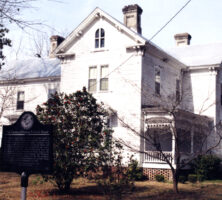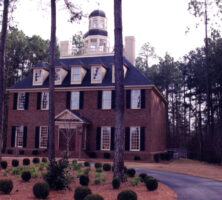Eastman, the seat of Dodge County, is a rural town of 5,658 residents, according to the 2020 U.S. census. It is located in the central part of the state, halfway between Columbus and Savannah, and was incorporated in 1905.
Early History
The expanse of land southeast of Macon is bounded by the Ocmulgee and Oconee rivers. Originally inhabited by Creek Indians, the area was lush with wiregrass and stands of enormous longleaf yellow pines. In the early nineteenth century Native Americans were forced out by white settlers, but the land remained thinly populated, covered by large tracts of piney woods.

With the opening of the Macon and Brunswick Railroad in 1869, pioneer settlers moved into the area in search of timber. Among the first was William Pitt Eastman of Gilmanton, New Hampshire, who arrived in 1868. Eastman, part owner and agent for the Georgia Land and Lumber Company, held title to 400,000 acres of land. The railroad stop in the area was originally designated “Station 13,” but the name was shortly changed to Eastman. In 1870, upon learning that the railroad had renamed the station in his honor, William Eastman founded the town, donating much of his own land.
William E. Dodge and his family came to the area from New York shortly after the Civil War (1861-65) to harvest timber. He purchased a large tract of land stretching from the Oconee to the Ocmulgee. In 1870 the state legislature created a new county and named it for Dodge. The Dodge land purchase and their forceful possession of the land brought much discord, armed conflict, and bloodshed. Many pioneer settlers, for good reason, believed they held legal title to various tracts, particularly their homesteads. In 1923, after forty years of criminal and civil litigation in federal court, an order was issued disposing of the last case, in which Norman W. Dodge sued 381 defendants. By then all the majestic pines were gone, along with the sawmills.
Race Riot of 1882
Eastman was the location of a riot that broke out in late summer 1882. Accounts from the period say that thousands of African Americans from middle Georgia gathered in Eastman for a big camp meeting. A number of people engaged in drinking and gambling, and eventually a scuffle broke out between two Black men. A white policeman restrained the aggressor, who managed to free himself, knocking down the policeman. The escaped man was shot as he ran away, by either another policeman or the man with whom he had argued. Events quickly got out of hand, culminating in the murder of an innocent young white boy whose identity was mistaken by an angry crowd. In the ensuing frenzy, the Black crowd called for setting fire to white residences and killing local whites. Eventually the group was subdued and arrested. A few months later, about twenty-five people were tried and sentenced; six men and one woman were hanged, and the rest were to endure a life sentence of imprisoned labor.
Business and Industry
In the mid-1930s W. S. Stuckey established a small business that eventually brought fame, jobs, and wealth to Eastman. By 1960 Stuckey’s Fine Pecan Candies had approximately 1,000 employees and 115 roadside stores. At that time $5 million worth of candy was manufactured annually.

The local economy in 2004 was well dispersed, consisting of manufacturing firms, agribusinesses, retail stores, and wood products industries, as well as education, national defense, and health care. The town is served by U.S. Highways 23 and 341, the Norfolk Southern Railway, and a public-use airport that houses the Middle Georgia College Aviation Campus (formerly Georgia Aviation Technical College), a satellite campus of Middle Georgia College.








